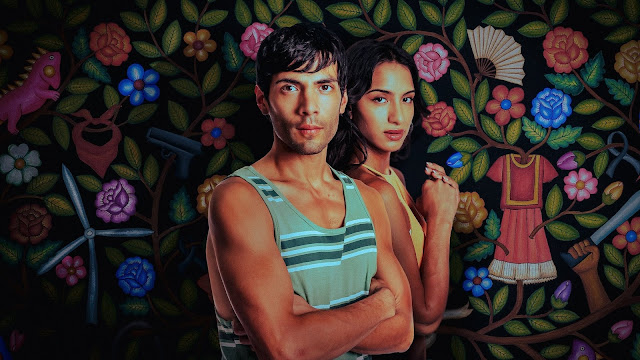Cast - Diego Calva, Trinidad Gonzales.
Alberto Barrera - Creator
"No sé porque nos la pasamos hablando mucho de amor y poquito de la amistad."
I would like to start by saying that as a cisgender man, I have a limited understanding of what being transgender and Muxe is, if this review is read as insensitive to those communities let me know so I can be educated on those subjects.
I am not a big Television fan, my relationship with this art medium has been tarnished by the popularisation of streaming services and the incredibly low-quality shows produced by Mexican companies. In recent years, Netflix series have taken more importance in the cultural zeitgeist of this country than things made by any TV company in the land, leading to more variety of stories, communities, and scope than anything made before. With that being said I would have never expected a series like Secreto del Rio to be, not only Netflix's most-watched series for the month of October but to also break through certain conservative groups and to see it everywhere on social media.
Secreto del Rio depicts the lives of people in the community of Tehuantepec, Oaxaca, a town that is known for the presence of Muxes, according to Wikipedia, Muxes are described as "A person Assigned Male at Birth that behaves in ways otherwise associated with women; they may be seen as a third gender." With my lack of knowledge of Mexican Television history, I cannot attest that this is the first positive representation of the community but it is certainly the most popular.
The story centers around two kids, Erick and Manuel (Who would later be known as Sicarú, a transgender woman), and their childhood in this town. During the first half of the show, they need to overcome bigotry (self and external), bullies, and the society that rejects Sicarú for being who she wants to be. In the latter half, both friends find each other again and they have to escape the past, changes are even more visible and the community has torn itself apart by crime and pessimism. The show properly depicts our anxieties in the identity we try to form when we are little as well as the relationships we make with others, all of this is presented candidly and honestly.
I would have never guessed that one of the most viewed series in the country could be about a transgender 11-year-old and her friend, when it seems that society has slowly become even more conservative and the idea of transgender youth is satanized by a lot of groups, to the point they outright negate their existence. I believe this is a step forward in terms of proper representation and hopefully, things will improve from here on out.
There is a catch on this where someone, with a more knowledgeable notion of gender and politics, could go even deeper, and there is this battle between being transgender and Muxe, at the end of the series there's a point where a Muxe character is hurt that Sicarú rejects her Muxe identity in favor of a transgender one, and is this battle between the "traditional" cultural idea of Muxe and the "modern" transgender. I don't believe the show wanted to say that transgender is a foreign concept and we should stick to tradition, I have seen large groups of people praise the series for opposing the "gender mafia" and not falling victim to "woke pronouns" and while one could think these are crazy people the reality is that a large portion of the Mexican population does not like to talk about these topics, is more conformable for them if its rooted in prehistorian history while still treating them as "other" rather than accepting people the way they are.
El Secreto del Rio doesn't just show us the strength relationships can have, a bond that can last years without ever disappearing but a world where everyone can and should live on their own terms, filled with love and the necessary elements to grow happy and satisfied. I would love to continue watching shows that portray a side of society that is not only real, dangerous, and at times horrible but also kind, empathetic, and honest. I would have never imagined this show ever becoming so popular among all demographics in this country and it reveals there is an audience for a more nuanced and realistic portrait of childhood in Mexico, especially among the rural towns that compose it.


Comments
Post a Comment